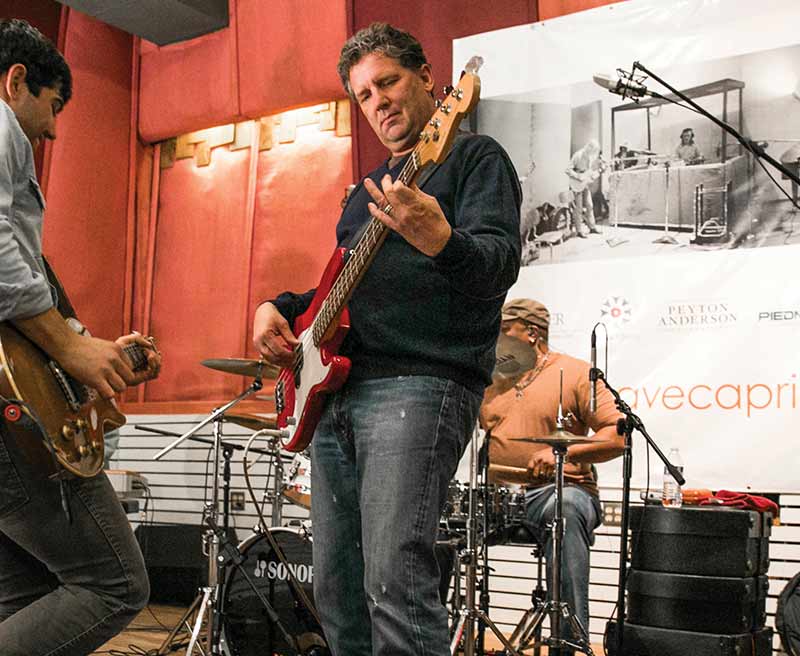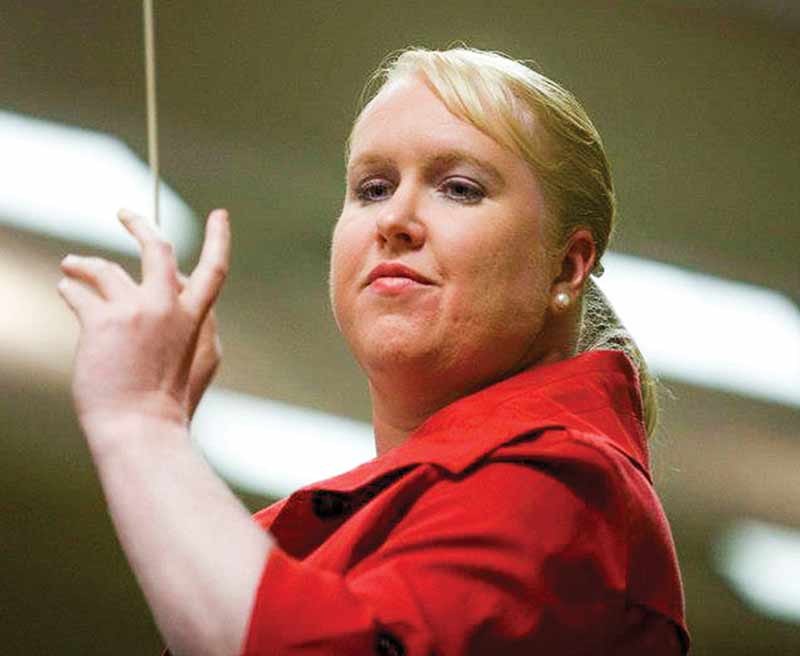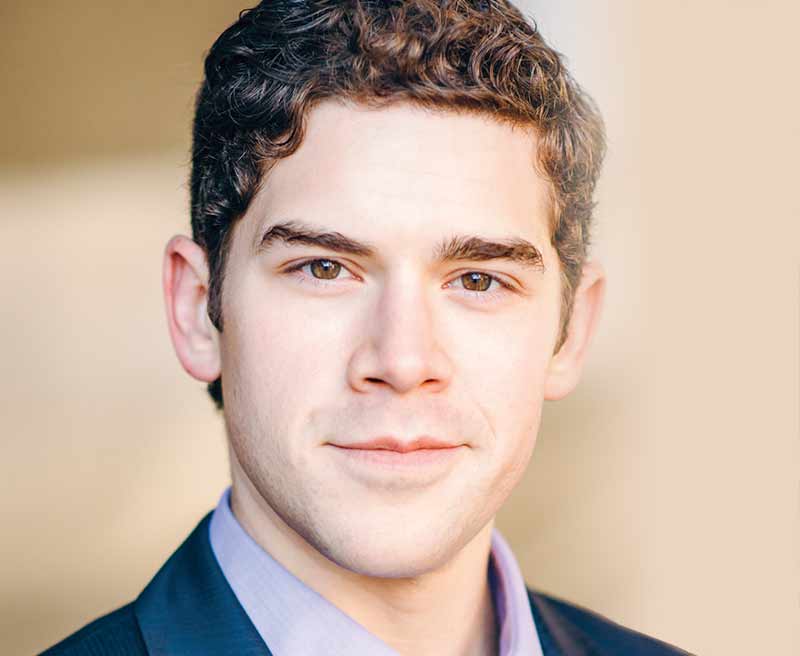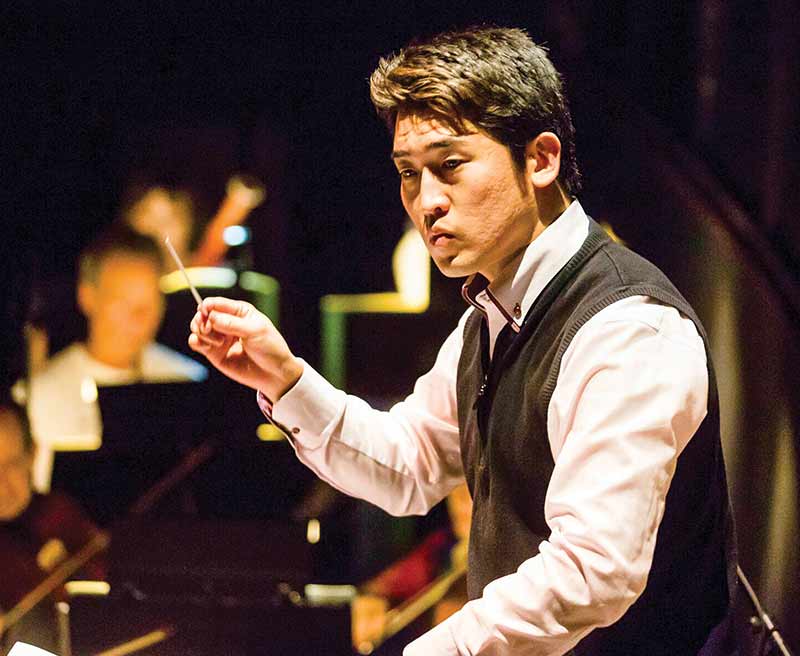“To create, to discover, to inspire” is both the mission and the means propelling the arts at Mercer.
John Rutter’s Requiem begins softly, on a haunting, almost hesitant note. Just a few beats in, however, the music begins to quicken, and the tapping of the lone timpani is joined by the melancholy yaw of the strings. Within the space of a heartbeat, the swell of the singers’ voices ascends on the music, a celestial choir of many imploring the divine for the intercession, and seeking the comfort of perpetua luceat – perpetual light.
Rutter’s remarkable work – notable for its rich themes explored through traditional Latin liturgy, English psalms, and selections from the Book of Common Prayer – is one of the composer’s most beloved pieces. Since it was first published in 1985, the ambitiously conceived choral and orchestral mass has been performed countless times by some of the world’s most renowned musicians and singers.
On Feb. 19, 2017, Rutter’s Requiem became part of the Mercer’s pantheon as well.
Townsend School of Music’s February 2017 performance at Carnegie Hall
“Those of us who have spent our careers doing music don’t rely on the cheering of an audience to determine the worth of a program … but that was incredibly gratifying.”
Performing on one of the most revered stages in the world, the Mercer Singers and the Robert McDuffie Center for Strings Ensemble were joined by Mercer Singers alumni, musicians from the Chancel Choir of the First Baptist Church of Christ in Macon, the Choral Society of Middle Georgia, and the Chancel Choir of Shallowford Presbyterian Church in Atlanta. Dr. Stanley L. Roberts, director of choral studies and the Arthur Lowndes Rich Professor of Choral Conducting at Mercer, conducted the piece. It was one of three musical components of the gala concert presented by the University and Townsend School of Music.
The musicians and vocalists introduced the gala concert on the Perelman Stage in Carnegie Hall’s Stern Auditorium, the cornerstone venue where Stravinsky played to a U.S. audience for the first time and Maria Callas brought down the house on her farewell performance tour. From Leonard Bernstein to the Beatles to Benny Goodman, Carnegie Hall has played host to the world’s finest musical talent, so even performing in those hallowed halls is no small thing. But when the Mercer-led musical collective made its debut, they played to a full house, and when the final refrain of Requiem was sung, the performers received a standing ovation.
“They were on their feet cheering,” says Dr. David Keith, dean of Mercer’s Townsend School of Music. “Those of us who have spent our careers doing music don’t rely on the cheering of an audience to determine the worth of a program … but that was incredibly gratifying.”
The Magic of Art
Eric O’Dell has a favorite saying he likes to repeat to his students: “Art no easy; art no cheap; art hard work.”
A Mercer alumnus, O’Dell earned his Bachelor of Arts (B.A.) degree in 1992. After receiving his Master of Fine Arts (M.F.A.) from Florida State University, Eric returned to Macon in 1994, and served as an adjunct professor at Mercer before joining the Arts Department faculty in 2013 as an assistant professor.
Passing on “the magic of art” that he first discovered at Mercer as an undergraduate, is part of Eric’s continuing mission — both as a teacher and a working artist.
The discipline of creative expression in any form requires hard work and a deepening commitment to edification for its own sake, Eric maintains. But at its best, he says, art is a breathtaking, illuminating force of nature capable of uplifting — even transforming — humankind. “Art is a deep and abiding connection to the community. It’s really easy to treat art cheaply if you keep it about the individual.”
Over the years at Mercer, O’Dell has taught classes in drawing, art history, art appreciation, art criticism and 3D design. As a drawing professor, he has led multiple summer sessions in Rome, Florence, Paris and Athens as part of Mercer’s Study Abroad program. In addition, he is also an ongoing instructor for Great Books, an eight-course program that serves as a general education track in the College of Liberal Arts (CLA).
From Descartes to Shakespeare and Goethe, to classic works by authors as diverse as Flannery O’Connor and Karl Marx, Great Books provides students with a grounding foundation in religious thought, philosophical thinking, political debate, and the discoveries of science — all keystones of manifesting the creative spirit and the study of art.
“Remember when God said to Moses, tell them that ‘I Am’ sent you? Art is about that ‘am-ness’ — who and what you are in this world,” O’Dell says.
“Whether it’s music or art, a good color or a good composition can move thousands of people. Art is a distinctly human thing.”
And so uniquely elevating to the “inward places of the soul,” as Plato called it, that a person can spend an entire lifetime attempting to decipher and describe the nearly inexplicable alchemy that occurs through its creative expression.
“Music unlocks the mystery of life for many in a way that words cannot. It has transformative powers that move us from our daily existence — which can be full of detours and potholes — to a sense of hope and well-being,” Dr. Keith says, adding, “Our goal is for our students to grasp essential music skills, and also to instill a desire to use those gifts to make the world better through those gifts.”
Forging New Paths
In April 2015, the Mercer Board of Trustees undertook the usual business of passing an operating budget for the coming academic year, discussing the important points of holding down tuition where possible, and increasing the resources and infrastructure needed to support the University’s ever-increasing undergraduate enrollment.
In another notable item of business, the board also authorized a new Bachelor of Fine Arts (B.F.A.) degree in the College of Liberal Arts to augment the existing B.A. degree. It was an important step in preparing Mercer to invest in what economist and author Dr. Gerald Gordon calls “the currency of the 21st century.” Gordon, who also serves as the president/CEO of the Fairfax County, Virginia, Economic Development Authority, defines that currency as “creativity.”
It’s a sentiment echoed by other modern-day leaders of industry.
“We need people who think with the creative side of their brains — people who have played in a band, who have painted,” said Annette Byrd, an executive for GlaxoSmithKline. “It enhances symbiotic thinking capabilities, not always thinking in the same paradigm, learning how to kick-start a new idea, or how to get a job done better, less expensively.”
“We need people who think with the creative side of their brains — people who have played in a band, who have painted.”
From a dollars-and-cents perspective, the arts directly generated $166.3 billion in economic activity in the U.S. in 2015. According to figures provided by Americans for the Arts, related nonprofits and arts and culture-based industries generated $63.8 billion in spending, plus an additional $102.5 billion in event-related expenditures by their audiences. That translated into:
- 4.6 million full-time equivalent jobs
- $27.5 billion in federal, state and local government revenue
- $96.1 billion in household income.
Years in the making, the B.F.A. directly positions art students at Mercer to competitively enter the workforce. Developing this enhanced educational track also recognizes the confluence of a rapidly evolving global economy, the impact of emerging technologies and the powerful sway that dynamic design and artful innovation holds over even the most mundane aspects of life — and at diverse touchpoints. The influence of those skillsets can range from how developers render websites for businesses to connect with customers, to how architects direct function and flow in living and work spaces, to the influx of “virtual reality” rapidly populating every conceivable, consumable media platform.
Along with more traditional B.A. degrees in Studio Art, Graphic Design and Art History, the interdisciplinary B.F.A. program offers Mercer students access to new career and life paths with opportunities to develop polished portfolios and seek internships in private and public sectors.
The new B.F.A. offering is also a powerful recruitment tool, says Art Department Chair Gary Blackburn. He adds the intensely focused coursework and thought leadership in and outside the classroom that are part and parcel of the interdisciplinary visual arts program also compels students to explore new creative directions and fine-tune highly competitive proficiencies in drawing, printmaking, photography, digital media, public art installations, performance, videography and ceramics.
Even as the B.F.A. program takes flight, leadership in CLA is already eying potential academic expansion. Dr. Anita Olson Gustafson, dean of the College, says they are “exploring the option” of adding an M.F.A. program and weighing the resources and investments that would be required versus the growth and benefits it would bring.
The Association of American Colleges and Universities (AACU) defines a 21st Century liberal arts education as “an approach to learning that empowers individuals and prepares them to deal with complexity, diversity and change. It provides students with broad knowledge of the wider world (e.g., science, culture and society) as well as in-depth study in a specific area of interest.”
Moreover, the AACU contends, “a liberal education helps students develop a sense of social responsibility, as well as strong and transferable intellectual and practical skills such as communication, analytical and problem-solving skills, and a demonstrated ability to apply knowledge and skills in real-world settings.”
Noting her zeal for “the humanities” and predisposition towards the liberal arts, Dr. Gustafson maintains students who are exposed to the idylls of such an education — particularly in the kind of small-classroom settings for which Mercer is renowned — does indeed offer daily opportunities to learn to think analytically as well as creatively, as well as shape and hone students’ foundational communication skills. For Mercerians actively pursuing careers in the visual or performing arts — or simply being exposed to both through elective classes and an abundance of opportunities to plug in through CLA — “there’s no limit to what we can do.”
Distinguished University Professor Robert McDuffie performs with the McDuffie Center students during a recent recording session.
Hitting Just the Right Note
That same fervor and spirit is alive and well at Townsend School of Music, which continues to rise on the tide of national recognition and gain prestige for its award-winning student body, as well as its artist faculty of 15 adjuncts instructors, 15 full-time professors, and 10 Distinguished Artists currently in residence at the McDuffie Center for Strings.
Additionally, the School offers aspiring musicians the allure of not only state-of-the-art performance facilities and studio space, but also a globe-trotting tour of festival performances, concert series and special performances for the School’s three collegiate choirs, the University Wind Ensemble, University Orchestra, Jazz Ensemble, Jazz Combo, Percussion Ensemble and Flute Choir.
“We want you to become the best musician you can be, but we also want you to become the best person you can become.”
At both the undergraduate and graduate levels, courses of study at the School range from performance-based to music education, and a unique, ecclesiastical emphasis is available at the graduate level through the Townsend-McAfee Institute’s Church Music program. Degree options for undergraduates include a Bachelor of Music in Performance (B.M.), Bachelor of Music Education (B.M.E.), or Bachelor of Arts in Music (B.A.). Graduate studies include a Master of Music in Performance, Master of Music in Collaborative Piano (vocal and instrumental), and a Master of Music in Conducting.
To help nurture student musicians pursuing their degrees, Townsend School of Music touts such feathers in the cap as its designation as an All-Steinway School, ensemble rehearsal rooms with recording capability, numerous practice rooms, labs, working classroom space, and the Neva Langley Fickling Hall in the McCorkle Music Building. The 200-seat recital hall features outstanding acoustics, Dr. Keith says, and is equipped with a pipe organ and professional-level audio and recording equipment.
At an even more intensive level, the McDuffie Center for Strings offers conservatory-level master classes, private instruction and coaching sessions. Housed off-campus in a renovated historic structure on College Street, the McDuffie Center operates as a special institute within Townsend School of Music and caps enrollment at 26 students: 12 violinists, six violists, six cellists and two double bassists.
Remaining faithful to artistic pursuits that are “fundamental to our humanity,” mentoring young instrumentalists and vocalists “to achieve at their highest levels,” and positioning students to pursue successful careers in music, is the demand of every instructor and staff member under his leadership, Dr. Keith says. It requires a fine balance between designing a curriculum that offers a core comprehensive study of musical skills and nurturing the development of a “world view” through rigorous educational requirements, he adds.
“We want you to become the best musician you can be, but we also want you to become the best person you can become,” Dr. Keith says.
Setting the Stage
“The play’s the thing, wherein I’ll catch the conscience of the king,” Shakespeare famously wrote in Hamlet, revealing not only the namesake character’s inner dialogue, but also the powerful exchange that can occur between a performer and his or her audience.
It’s the kind of “reciprocal relationship,” that appeals to Mercer Director of Theatre Scot Mann. No stranger to Shakespeare, Mann has been cast in and directed numerous productions written by the bard, appearing in productions mounted by the Georgia Shakespeare Festival, New American Theater, New American Shakespeare Theatre, and the Alabama Shakespeare Festival.
Like Eric O’Dell, Mann is a Mercer alum who sought a graduate degree elsewhere, then returned to his alma mater to pass on the gifts of mentorship and artistic collaboration that had been shared so generously with him when he came to campus as a student, he says — one of them being a unique specialty in combat choreography.
A certified sword master, in-demand stunt professional, and president of the Society of American Fight Directors, Mann teaches Mercer students the finer points of stage combat and movement, as well as acting, directing and improvisation. Mounting a handful of productions every year — as diverse as James and the Giant Peach, She Kills Monsters and Merchant of Venice — the Mercer Theatre Department offers students the chance to put their behind-the-scenes skills and front-of-house talents to good use.
 Every performer, of course, requires a stage, and Mercer has invested in venues that serve not only the needs and interests of students, but also benefit the Middle Georgia community.
Every performer, of course, requires a stage, and Mercer has invested in venues that serve not only the needs and interests of students, but also benefit the Middle Georgia community.
The Tattnall Square Center for the Arts, located on the perimeter of campus in the heart of the College Hill Corridor, is housed in the renovated rescue of a century-old church. Opened in 2014, the multi-purpose arts space holds classrooms, studios, and expansive, temperature-controlled storage space for costumes and props used in Theatre Department productions. The painstakingly restored venue also opens its doors to community organizations for lectures, arts events and seminars.
On an even more ambitious scale, the historic Grand Opera House, located in downtown Macon, has been operated by Mercer since 1995. In its original heyday, such greats as Sarah Bernhardt, Pavlova, Will Rogers, Charlie Chaplin and Houdini wowed Macon audiences at The Grand. Today, the venue continues to attract touring Broadway shows, as well as offer Mercer students performance and stagecraft opportunities through the Mercer-staged operas and musical theatre productions. Since 1986, The Grand has served as the home stage for The Nutcracker of Middle Georgia, one of the most well attended and cherished annual arts-related events in the area.
Hitting Just the Right Note
Two other recently completed large-footprint developments continue to deepen Mercer’s ties to Macon and increase the likelihood that President William D. Underwood will see, in the relatively near future, his personal vision for the downtown area come to fruition.
“What I think downtown needs is to be filled with creative young people with tattoos and nose rings,” the president says.
Mercer has pioneered a major revitalization of the historic Capricorn Studio, a venture that was co-founded by the late Mercer alum Phil Walden. Walden’s brainchild took off, and the label is credited with the rock-and-roll rise to fame of the Allman Brothers Band, Wet Willie, Elvin Bishop and the Marshall Tucker Band, among others.
The label disbanded more than a decade after it was first launched in 1969, and the crumbling Capricorn building remained vacant. For years, the former epicenter of Southern Rock continued to fall into disrepair until it was rescued by NewTown Macon in 2010. The nonprofit group purchased the building with a grant from the Peyton Anderson Foundation and helped to lead the charge to renovate the historic structure and transform the facility as an anchor for the largest market-rate residential development ever conceived in downtown Macon.
Mercer committed to raising an additional $2 million to complete the restoration, which has been re-envisioned as Mercer Music at Capricorn, which offers recording and rehearsal space. It also serves as an incubator for music talent in the community, hosts offices and meeting spaces for arts organizations, and includes a two-story interpretive museum that tells the story of Capricorn and Macon’s rich and influential music history.
Just a few blocks away, on Second Street, Mercer has wholly remodeled and re-envisioned a historic building as a contemporary arts gallery and multi-functional space that includes working studios for art students. It’s a passion project for O’Dell, who has occupied his own painting studio space just around the corner since 1994. It’s a renaissance he’s hoped for and waited on for more than 20 years. McEachern Art Center opened in January 2019 and has featured exhibitions by visiting artists, Macon residents and Mercer faculty and students.
President Underwood takes a pragmatic view.
It is “enlightened self-interest” for Mercer to invest in the kinds of projects and arts programming that forge lasting connections with the community it calls home.
“The better Macon is, the better Mercer is.”
Artist Profiles

Steve Ivey
Steve Ivey is a 1984 graduate (Bachelor of Arts) of the College of Liberal Arts. A music producer and writer with 17 Billboard No. 1 hits to his credit, Ivey has won multiple Emmy, Grammy and Dove awards. His music has been in the Billboard Top 10 sales charts for 1,000 weeks with more than 10 million units sold. He began his company, Ivey Music International, as a junior at Mercer and went on to work with numerous other companies, such as Sony, Warner Brothers, Provident, EMI, Curb, NBC, ABC, CBS, Dollar General, Walmart, The Weather Channel, among others. He has produced music for artists such as Dolly Parton, Aaron Neville, Willie Nelson, Vince Gill, Blackhawk, Billy Dean, The Oak Ridge Boys, Thomas Kincade, Mark Wills, Jonathan Wyndham, Betty Cantrell and numerous others.

Caleb Brown
Caleb Brown is a 2016 graduate (Bachelor of Arts) of the College of Liberal Arts. As an undergraduate, he excelled on many fronts including as a running back on Mercer’s first football team since 1941 and as a student in the pre-physical therapy program. However, in the final semester of his senior year, Brown shifted his focus to pursue his lifelong talent — art — on a full-time basis. Inspired by art instructor Eric O’Dell, Brown founded his own business, FiNaO Enterprises LLC, and his artwork has attracted many prominent collectors, including Super Bowl MVPs, platinum-selling recording artists and Grammy Award winners. FiNaO stands for “failure is not an option” — the mantra on which Brown centers his efforts. Using many of the lessons he learned at Mercer, he strives to set an example that inspires others to pursue excellence and work constantly towards a life they love.

Amy Wilson
Amy Wilson is a 2010 graduate (Master of Music) of the Townsend School of Music. Currently, she is music director of the Atlanta Philharmonic Orchestra, artistic director and founder of the Southeast Stonewall Music Festival and principal guest conductor of the Atlanta Musicians Orchestra. Wilson has been invited to spend a summer in Aspen as a guest of Robert Spano, where she studied with him privately. She also attended the Bakersfield Conducting Workshop and the Seasons Fall Festival, where she conducted the Bakersfield Symphony and Yakima Chamber Orchestra. She also holds degrees from the University of Cincinnati College-Conservatory of Music and the University of North Texas.

Amy Pirkle
Amy Pirkle is a 2002 graduate (Bachelor of Arts) of the College of Liberal Arts. A book artist, printer and instructor at the University of Alabama, Tuscaloosa, Pirkle has taught courses in the Honors College, Blount Undergraduate Initiative, Department of Art and Art History, and New College. Her work has been featured in 500 Handmade Books: Inspiring Interpretations of a Timeless Form and 500 Handmade Books: Volume 2, both by Lark Books in New York, as well as in numerous exhibitions and permanent collections. She earned the Raymond F. McLain Book Arts Award and a Wingate Fellowship from the University of Alabama and served a Winter Letterpress Residency at the Penland School of Crafts in 2010 and a creative residency at Hambridge Center for Creative Arts and Science in 2013. She is a member of the Guild of Book Workers and the College Book Art Association and has served as a freelance printer and printing assistant at Pace Editions in New York City. She earned her Master of Fine Arts from the University of Alabama.

Jonathan Johnson
Jonathan Johnson is a 2011 graduate (Bachelor of Music) of the Townsend School of Music. A tenor, Johnson has recently appeared in the Lyric Opera of Chicago’s productions of “Les Troyens,” “Lucia di Lammermoor” and “Don Quichotte.” He made his debuts at the San Diego Opera as Fenton in “Falstaff,” the Kansas City Lyric Opera as Frederic in “The Pirates of Penzance” and the Piedmont Opera as Lindoro in “L’Italiana in Algeri.” Currently a member of the Patrick G. and Shirley W. Ryan Opera Center at the Lyric Opera of Chicago, he has appeared in the company’s mainstage productions of “Le nozze di Figaro,” “The Merry Widow,” “Der Rosenkavalier,” “Capriccio,” “The Magic Victrola” and “The Passenger.” He earned a master’s degree and artist diploma from the University of North Carolina School of the Arts in Winston-Salem.

Braeden Orr
Braeden Orr is a 2014 graduate (Bachelor of Arts) of the College of Liberal Arts. Currently signed with East Coast Talent, his most recent work as a film and television actor includes the roles of Deputy Silas Greene in Investigation Discovery’s “Your Worst Nightmare,” Chester Killmore in “The Family That Preys” and Robert in “Prowlers.” His most recent stage work includes portraying Porterjohn in “99 Uses for a Naked Man” and Claudius in “Rosencrantz and Guildenstern Are Dead.” His most recent production work includes writing and directing the short films “Crypts and Cretins,” “SHOTS” and “Safe Words,” as well as the web series “Dire Straights.” He is currently pursuing his Master of Arts in film and television from Savannah College of Art and Design.

Patrick Mathis
Patrick Mathis is a 2013 graduate (Bachelor of Science) of the College of Liberal Arts. A freelance lighting, projections and media designer, he has worked in regional theaters from Kentucky to Cape May, New Jersey, and recently accepted a position as a graduate teaching assistant at Utah State University. His most recent works include lighting design for the Utah State Theatre’s production of “Next to Normal,” Shawn Fisher’s latest premiere “Fear Not Beasts of Sand” with the Fusion Theatre Project, as well as projection design for “Dogfight” with the Utah State Theatre Company. He is a standing member of the Society of American Fight Directors, the United States Institute of Theatre Technologies, and Actors Equity.

Keitaro Harada
Keitaro Harada is both a 2007 (Bachelor of Music) and 2008 (Master of Music) graduate of the Townsend School of Music. He is currently in his third season as associate conductor of the Cincinnati Symphony Orchestra and Cincinnati Pops. Recently, Harada made his debut with the West Virginia Symphony, South Bend Symphony, Boise Philharmonic, and assisted at Los Angeles Philharmonic. Overseas, he conducted Bamberg Symphony, Frankfurter Opernund Museumsorchester, Tokyo Symphony, Tokyo Philharmonic, Kanagawa Philharmonic and New Japan Philharmonic. This spring, he was on the staff of the Asia Tour with Cincinnati Symphony and the Pops Orchestra. This summer, he made his debut with the Charlotte Symphony, Music In The Mountains Festival, Cincinnati Opera, and participated in the Europe Tour with the Cincinnati Symphony Orchestra. In the fall, he will conduct the Louisiana Philharmonic and make his European opera debut with the Sofia National Opera in Bulgaria.
